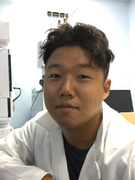April 25, 2019

Name: Bumsoo Kim
Institution: Texas A&M University
Place of residence: College Station, Texas, USA
What kind of science do you do?
I am a graduate student studying organic geochemistry to understand the past climate change during the Earth's geological history. I collect marine sediment samples from the International Ocean Discovery Program (IODP) and analyze lipid biomarkers, so-called "molecular fossils". Lipid biomarkers are powerful tools in providing direct evidence of the microorganisms and understanding the climate variations in the present and in the past. I enjoy playing with analytical instruments, such as gas/liquid chromatography and mass spectrometry, to trace lipid biomarkers which are archived in marine sediments for millions of years.
Why did you choose this field?
My research during my Master's degree was focused on radiocarbon to understand the carbon cycling in the Southern Ocean where it is sensitive to climate change. Then I became more interested in how the Earth's climate had changed during the past. The lessons that we learnt from the past climate will help better understand the Earth's climate system for the future. Like the expression "In order to go two steps forward, you need to take one step back," that is why I choose to study the past climate.
What's the most interesting place you've ever done field work?
During my Master's degree, I was able to participate on an international expedition abroad R/V Araon to the Amundsen Sea, Antarctic. I have been on several long-term oceanographic cruises since I was an undergraduate student, but this cruise was different. Antarctica is a place that you cannot just go, even if you had money. I still remember the first moment in my life when I saw the Antarctica with ice-sheets over tens of meters of thickness. For more than 3 months, I collected seawater samples for radiocarbon measurement to examine how rapidly atmospheric carbon dioxide is absorbed and how long the water circulates (residence time) in the Amundsen Sea. Also, I had submitted my applications for graduate school before the cruise, and I had a phone interview during the cruise through the satellite phone with one of the professors who is now my current advisor, Dr. Yi Ge Zhang at Texas A&M University.
What are you working on now?
I am currently focusing on reconstructing the methane cycling, especially methane hydrate dissociation events, and its impact to the global climate during the Earth's history. Marine methane hydrate is the largest readily exchangeable carbon reservoir on Earth's surface. Small changes in temperature and pressure might perturbate the stability of methane hydrate and release massive amount of methane, a powerful greenhouse gas, into the ocean and atmosphere. The history of hydrate dissociation, however, is difficult to constrain. My research goal is to provide direct evidence of gas hydrate dissociation based on lipid biomarkers and their isotopes, to better understand the role of marine methane hydrate in climate change during the geological past which helps to shed light on the fate of methane in a changing climate of the future.
Do you have a role model? And if so, who is it?
Dr. Christopher Reddy, a marine chemist at Woods Hole Oceanographic Institution. I would like to say his words greatly encouraged me when I was spending tough time in graduate school. I shortly chatted with Dr. Reddy after he gave a talk in a conference held at Texas A&M University. He told me, "You have a task that needs 12 months to complete. If you spend the whole 12 months trying to finish it, it might take more than 12 months. But try spending a month for yourself, for your friends, and for your families, then you can finish the task in 11 months."
If you could sit next to anyone on an airplane, who would it be?
There are so many interesting people that I would love to chat with on an airplane, but if possible, I wish it could be my grandfather. He passed away when I was very young. My grandfather was also an organic geochemist in South Korea. If he could sit next to me on an airplane, I will first tell him how much I missed him and tell him about how I grew up, how I got admitted to the same university he graduated, and how I became a geochemist. I am sure he will be proud of me.
What's your favorite city in the world and why?
It might not be a city, but my favorite place is a small province called 'Moalboal' in Cebu Islands, Philippines. In 2009, I just got my first scuba diving license and was finding a special place to go dive before I was enlisted to the Korean army. Then I had a chance to go to Moalboal with my friends. There, I became deeply attracted to the beautiful tropical ocean and coral reefs, so I asked the manager of the diving shop if I can stay and work as staff. After then, I spend more thane a year in Moalboal, working as a dive master, guiding divers underwater and touring guests. The great experience in Moalboal allowed me to 'see' and 'hear' the ocean, which greatly inspired me to study oceanography.
What is your favorite downtime activity?
I like to watch movies but most of all, I love to go to the ocean for swimming and diving!